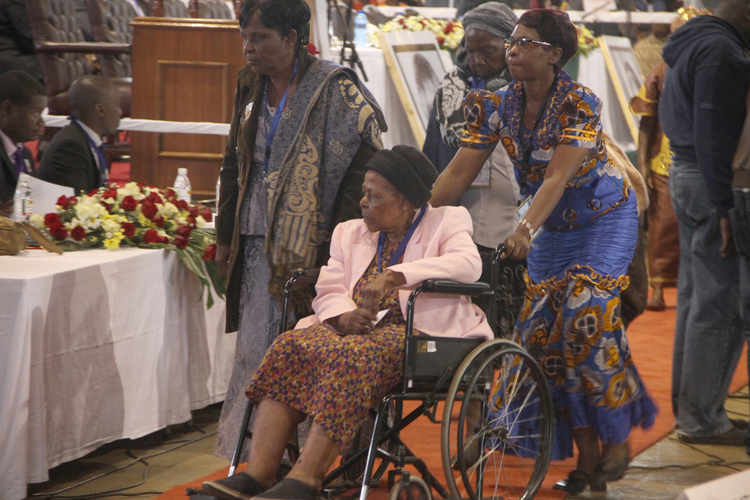
The Sunday Mail

Cde Jane Lungile Ngwenya was one of the female pioneers of Zimbabwe’s nationalist politics, occupying leadership positions at the formation of the African National Congress in the 1950s and, subsequently, the National Democratic Party. She was also among the first leaders of Zapu at its formation in 1961. The Sunday Mail’s Chief Reporter Kuda Bwititi spoke to Cde Ngwenya as President Mugabe met national liberation war veterans in Harare last Thursday.
Below is Cde Ngwenya in her own words.
***

Veteran nationalist Cde Jane Ngwenya arrives for President Mugabe’s meeting with war veterans in Harare last Thursday.(Picture by Justin Mutenda)
Born in Buhera on June 15, 1935, I became involved in politics as a teenager. My political activities continued during the trade unionism of the 1950s when blacks demonstrated against whites over ill-treatment and poor working conditions and remuneration.
I then joined full time politics at the ANC’s formation.
My involvement with politics led my husband and I to divorce as he was unhappy with the Rhodesian police always knocking at our door.
His mind couldn’t envelope how a woman could bring so much trouble to the family.
I was to join the National Democratic Party, becoming the only woman elected into the 65-member national executive.
The NDP was later banned and Zapu became my home from 1961. We travelled the length and breadth of the country, canvassing support.
As our and Zanu’s popularity grew, political temperatures soared, with the Rhodesians feeling our impact and subsequently establishing detention camps to curtail our activities.
I was detained at Grey Street Prison – now Bulawayo Prison – Wha Wha Detention Centre in Gweru and then Gonakudzingwa.
From detention, I left to organise Zapu activities in Zambia.
I was meant to go to Canada on a scholarship, but opted to remain in Lusaka, Zambia organising things alongside fellow comrades like Edward Ndlovu and Jason Moyo after Chikerema had left Zapu to form Frolizi.
I also worked closely with Dr Joshua Nkomo, Father Zimbabwe.
We mobilised comrades to join the armed struggle and travelled to countries such as China and Russia to source ammunition and other support.
I remember several incidents that took place during that period. Ethan Dube was kidnapped by Selous Scouts in 1973: I was there with him.
It was not easy for me, naturally, as a woman. I was tortured several times by the Rhodesians and became the first woman to have both hands and legs shackled.
This was after we had demonstrated against the regime in 1965.
Further, I was among the Zapu leaders who attended the Lancaster House Conference of 1979, and served in the majority Government before retiring from active politics.
I still follow politics, proffering advice when approached.
Meeting President Mugabe
The war veterans’ meeting with President Mugabe was historic; one of the most important events since Independence in 1980.
It made us reflect a lot. There was a lot of nostalgia. I bumped into comrades I had last seen in the 1960s.
As war veterans, we sometimes feel we are not accorded the respect we deserve.
Yes, we accept that life has to go on, and war veterans should not be on the agenda all the time. However, we should not feel that being a war veteran is a curse.
People should not forget that we want the best for Zimbabwe because that is precisely what we fought for and will always fight for.
The President is a person who understands us and identifies with us and our history. So, getting an audience with him was, in itself, very significant.
His pronouncement that we are now going to meet annually marked a new beginning that I am sure will open up a lot of good things for Zimbabwe.
I strongly feel that if we had been having such meetings, some of the things that have been happening in the party could have been avoided.
There were issues we could have easily deliberated on and found ways of resolving without resorting to drastic action.
That meeting made me realise that there are enemies in our midst.
Enemies come in different ways, but the best way to confront them is through unity. So, Thursday’s meeting was all about unity.
War veterans united with one voice and told the President issues they feel need to be addressed in Zanu-PF; unwarranted expulsions need to stop.
I felt the meeting invoked the spirit of the liberation struggle.
It made me think back on the meetings we held as Zapu in the 1960s, travelling across the country to mobilise the people around the one goal of achieving independence.
The meeting also proved that we need to unite in order to confront our challenges, the immediate ones being the economy and detractors.
I was happy that President Mugabe made it clear that people should not come to him with rumours and denigrate others and that differences between individuals must instead be tabled to find resolution.
In coming days, Zimbabwe celebrates its 36th Independence Day anniversary. I hope everyone will reflect on its importance, realising that unity of purpose won it for us.
We also need unity of purpose to confront the challenges we face as a country today.



